Sleep problems may be a risk factor for developing certain types of cancer—lung, colon, pancreas, and breast—and may affect the progression of these cancers and the effectiveness of their treatment. Conversely, symptoms of cancer or side effects of treatment, including restless legs and obstructive sleep apnea, may cause sleeping problems, reducing quality of life. Understanding the complex relationship between cancer and sleep creates opportunities to improve health, treatment options, and quality of life. Specifically, understanding how the peripheral nervous system and the brain regulate both the timing and rhythmicity of sleep (i.e., circadian control), and the balance between time awake and growing sleep pressure (i.e., homeostatic control), could improve survival rates and the quality of cancer treatment. To this end, Dr. Moore [HHMI Fellow] aims to identify the role of circulating dietary cholesterol on sleep and to conduct a targeted genetic screen to identify peripherally secreted proteins that affect either the circadian or the homeostatic control of sleep. These results will provide a means for therapeutic interventions to ameliorate the effects of sleep disruption. Dr. Moore received her PhD from Princeton University and her MS and BS from the City College of New York.
All Cancers
Current Projects

Certain immunotherapies work by instructing macrophages, a type of innate immune cell, to attack the tumor by phagocytosing, or eating cancer cells. However, macrophages rarely eat an entire cancer cell within a solid tumor. Instead, they nibble pieces off the cancer cell, a process called trogocytosis. While phagocytosis kills the cancer cell, trogocytosis usually doesn’t – and worse, nibbling removes the markers on the cancer cell that allow the immune system to recognize it as a threat. Dr. Morrissey is studying why some cancer cells die after being nibbled while others survive, with the goal of making macrophage-activating immunotherapies more effective. Specifically, she is studying Her2-positive breast and ovarian cancers, as it has been shown that Her2 immunotherapies cause trogocytosis instead of phagocytosis. This research could enhance any immunotherapy that is designed to activate macrophage phagocytosis, improving treatment of diverse cancers like lung cancer, lymphoma, and glioblastoma.
The PABPC1 protein has diverse roles in gene expression control that span functions in mRNA stability, polyA tail length control, and translation regulation. PABPC1 gene amplifications are detected in roughly 4% of cancer samples, but it is unclear how PABPC1 fits into the picture of cancer progression. Dr. Muller [HHMI Fellow] studies the sequence preferences of PABPC1 protein to understand the mechanistic details that determine which transcripts are subject to PABPC1-mediated regulation. Connecting these sequence preferences to the mis-regulation caused by excess PABPC1 may provide a therapeutic handle for cancers that contain PABPC1 gene amplifications. Dr. Muller received his PhD from the University of California, Berkeley and his BS from Arizona State University, Tempe.
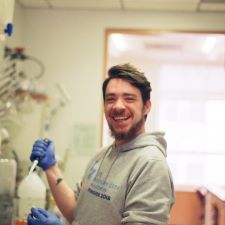
As different tissues in the body form, cells need to undergo a complex, precisely timed series of differentiation programs to form specialized cell types. Importantly, premature or delayed initiation of these programs can contribute to cancer formation. However, how timing of cellular differentiation is encoded on a molecular level is poorly understood. Dr. Noetzel is using the protozoan parasite Cryptosporidium parvum as a simplified model of eukaryotic differentiation. After infecting the intestinal lining of a mammalian host, these single-celled parasites undergo exactly three rounds of asexual replication before collectively differentiating into gametes. These studies will investigate how this hard-wired, intrinsic developmental timer is encoded. In his project, Dr. Noetzel aims to understand how these parasites "count to three," which will inform our basic understanding of how eukaryotic cells keep track of time during development. Dr. Noetzel received his PhD from the Weill Cornell Medical College, Cornell University, New York and his MSc and BSc from Georg-August-University, Göttingen.
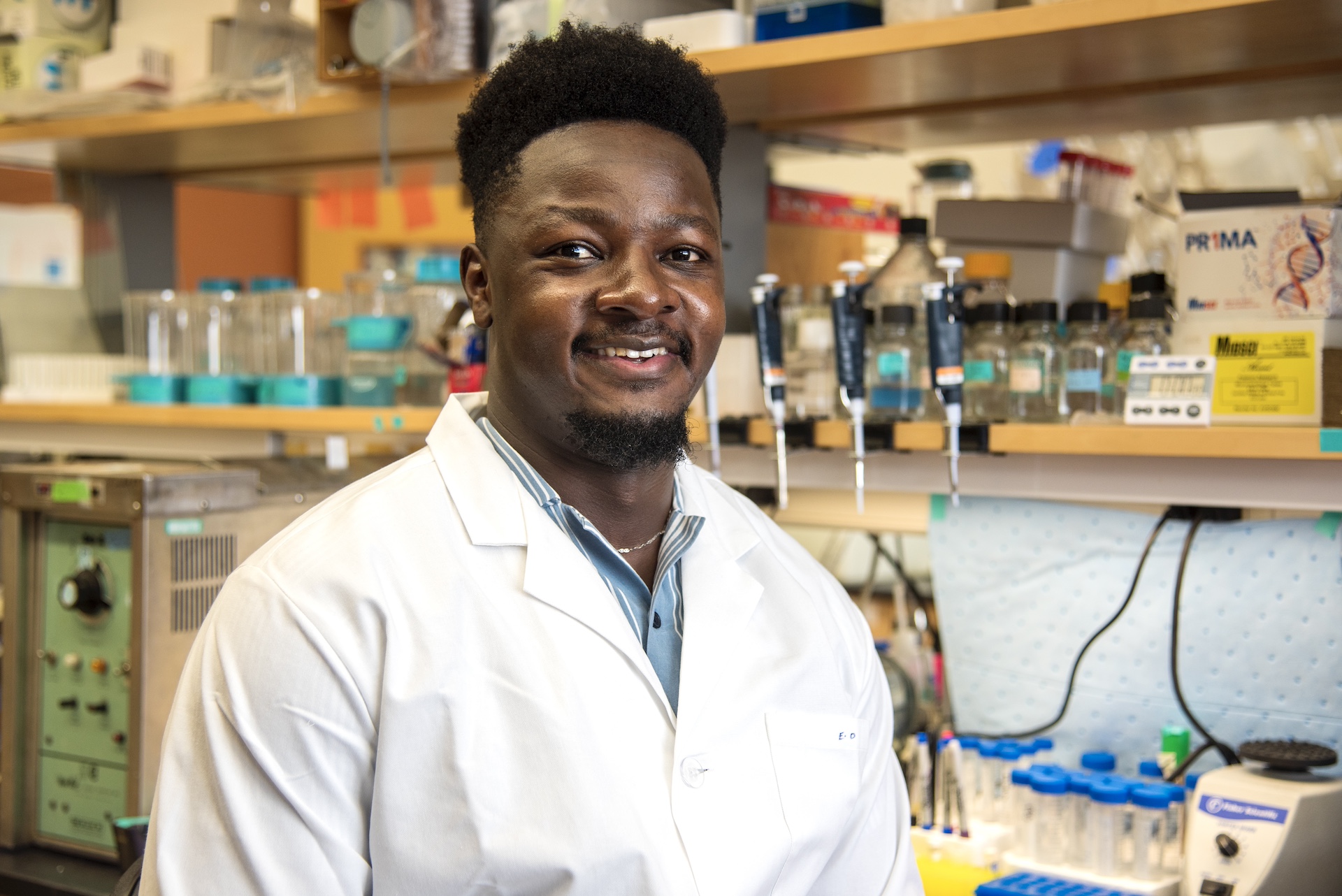
Dr. Omollo [Robert A. Swanson Family Fellow] studies how bacteria have evolved to achieve precise gene expression using strategically placed transcription terminators. In cancer cells, specific mutations lead to uncontrolled transcription of certain genes, resulting in elevated gene expression that fuels cancer progression. Using bacteria as a model, Dr. Omollo aims to uncover how RNA polymerases in cancer cells evade termination signals to maintain high levels of gene expression, encouraging cancer spread. Dr. Omollo received his PhD from University of Wisconsin-Madison, Madison and his BS from Michigan State University, Lansing.
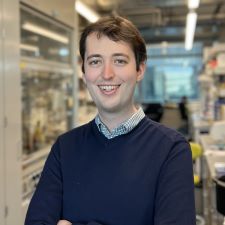
Chromatin remodelers are complex protein machines responsible for packaging DNA and regulating gene expression. Their dysfunction is strongly implicated in cancer. For example, certain types of sarcoma and ovarian cancer are driven by mutations in a chromatin remodeler called BAF. Combining experiments with theoretical work, Dr. Owen’s research aims to understand how remodelers recognize their target sites in the cell’s nucleus. By expanding our understanding of chromatin remodeling, the findings of this research will provide the groundwork for more effective cancer treatments—suggesting how drugs might target chromatin remodelers—as well as enhance our understanding of how existing drugs that target remodeler-adjacent mechanisms might work.
A central aim of this project is the development of new, quantitative models to explain the behavior of chromatin remodelers seen in experiments. Dr. Owen will achieve this by successive rounds of passing between theory and experiments repeatedly—measuring, modeling, then measuring again. For comparison to experiments, model predictions will be extracted computationally (e.g., numerically solving ODEs, or by exact stochastic simulation using Gillespie’s algorithm) or analytically (e.g., by the King-Altman procedure, and variants), as appropriate.

One way cancer cells evade immune attack is by constructing a thin material barrier called the glycocalyx on their surface to evade detection and destruction by surveilling immune cells. Tiny changes in the glycocalyx thickness, as small as 10 nanometers, can affect the anti-tumor activity of immune cells, including CAR T cells. Dr. Park’s [Merck Fellow] goal is to develop strategies to endow CAR T cells with the ability to penetrate the glycocalyx barrier in solid tumors such as breast cancer and glioblastoma. These strategies will increase the effectiveness of CAR-T cell therapy against solid tumors by overcoming a significant mechanism of immune cell evasion. Dr. Park received his PhD from Cornell University, Ithaca and his BS from Korea Advanced Institute of Science and Technology, Daejeon.
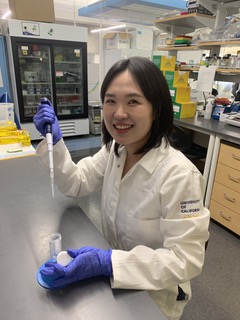
Macrophages are a major component of the body’s first line of defense, acting as sentinel cells that detect and respond to threats. One powerful trait of macrophages is their ability to modulate their response based on previous exposure to stimuli. In cancer, this adaptability can steer macrophages either to fight tumors or to protect them, depending on prior experiences. This phenomenon is often referred to as “macrophage memory.” Though macrophage memory is increasingly recognized as a factor influencing cancer progression and treatment outcomes, the mechanisms that allow macrophages to retain this memory remain unclear. Dr. Park hypothesizes that exposure of macrophages to certain stimuli leads to lasting changes in the structure of their DNA. He will combine both experimental and computational approaches to elucidate how this memory forms and how it affects the expression of immune-related genes. By uncovering the principles of macrophage memory formation, he will lay the groundwork for strategies to reprogram macrophages, potentially enhancing anti-tumor immunity and improving cancer therapy.
Dr. Park will use machine learning–aided genome modeling, leveraging bulk Hi-C data, to reconstruct 3D chromosome structures and validate them with deep learning–based image analysis. This framework will infer single-cell 3D chromosome structure in macrophages. Dr. Park will also quantify nuclear speckle–mRNA spatial relationships using microscopy and develop mathematical models of gene regulation that incorporate transcription factor activity. This integrative approach will reveal how chromosome structure shapes macrophage immune memory and functional response in cancer.
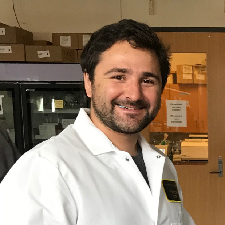
Dr. Parker [HHMI Fellow] studies the role of molecular assemblies known as stress granules that form when cells are exposed to stressful conditions. The assembly of stress granules upon cellular insult is thought to regulate gene expression and modulate cell survival. Notably, stress granules are present in various cancers and many chemotherapeutic treatments lead to the formation of stress granules. Dr. Parker aims to determine the mechanisms regulating stress granule assembly and disassembly to understand how stress granule formation supports the development of cancer and chemotherapy-resistant tumors. This research has the potential to discover novel targets to treat cancers as well as sensitize chemotherapy-resistant cancers to existing treatments. Dr. Parker received his PhD from Colorado State University and his BS from the University of Oregon.
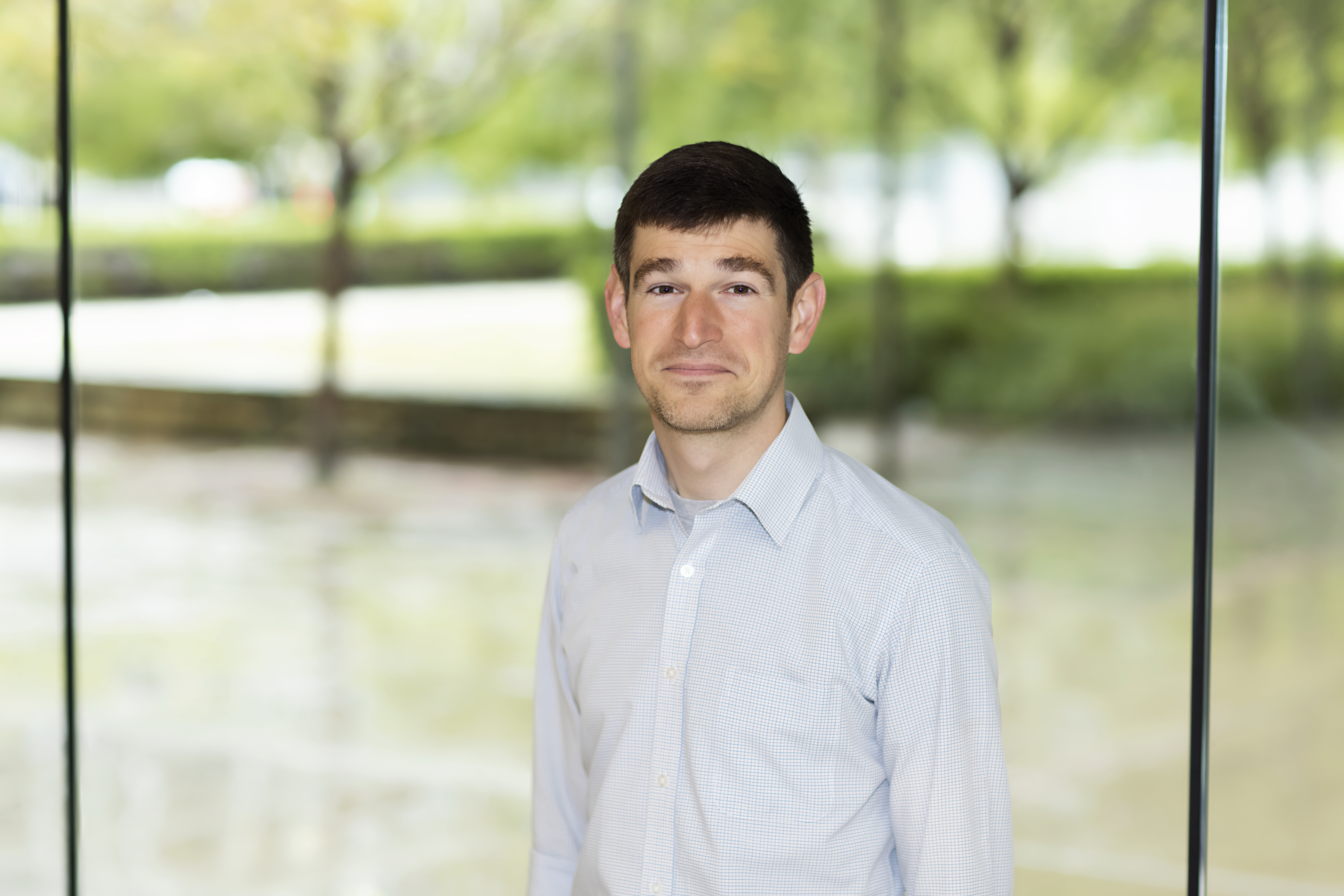
Leukemia is a cancer of the immune system and is a major cause of death from cancer in children and young adults. Chimeric antigen receptor (CAR) T cell therapy, which involves genetic engineering of a cancer patient’s own immune system cells to fight cancer, has demonstrated curative potential. Despite excellent initial responses to treatment, however, leukemia recurs in up to half of pediatric leukemia patients after CAR T treatment. A major cause of treatment failure is that CAR T cells do not attach to cancer cells as strongly as natural T cells do to their targets, and this limits their ability to find and kill cancer cells. Dr. Pauerstein’s research is attempting to improve CAR T cell sensitivity to cancer cells using synthetic cell adhesion molecules, a type of molecular glue between two cells. Engineering adhesion into CAR T cells should build a synthetic immune synapse that can help improve cell-based treatments for leukemia and eventually other cancers. Dr. Pauerstein received his MD, PhD from Stanford University, Stanford and his BA from Rice University, Houston.







